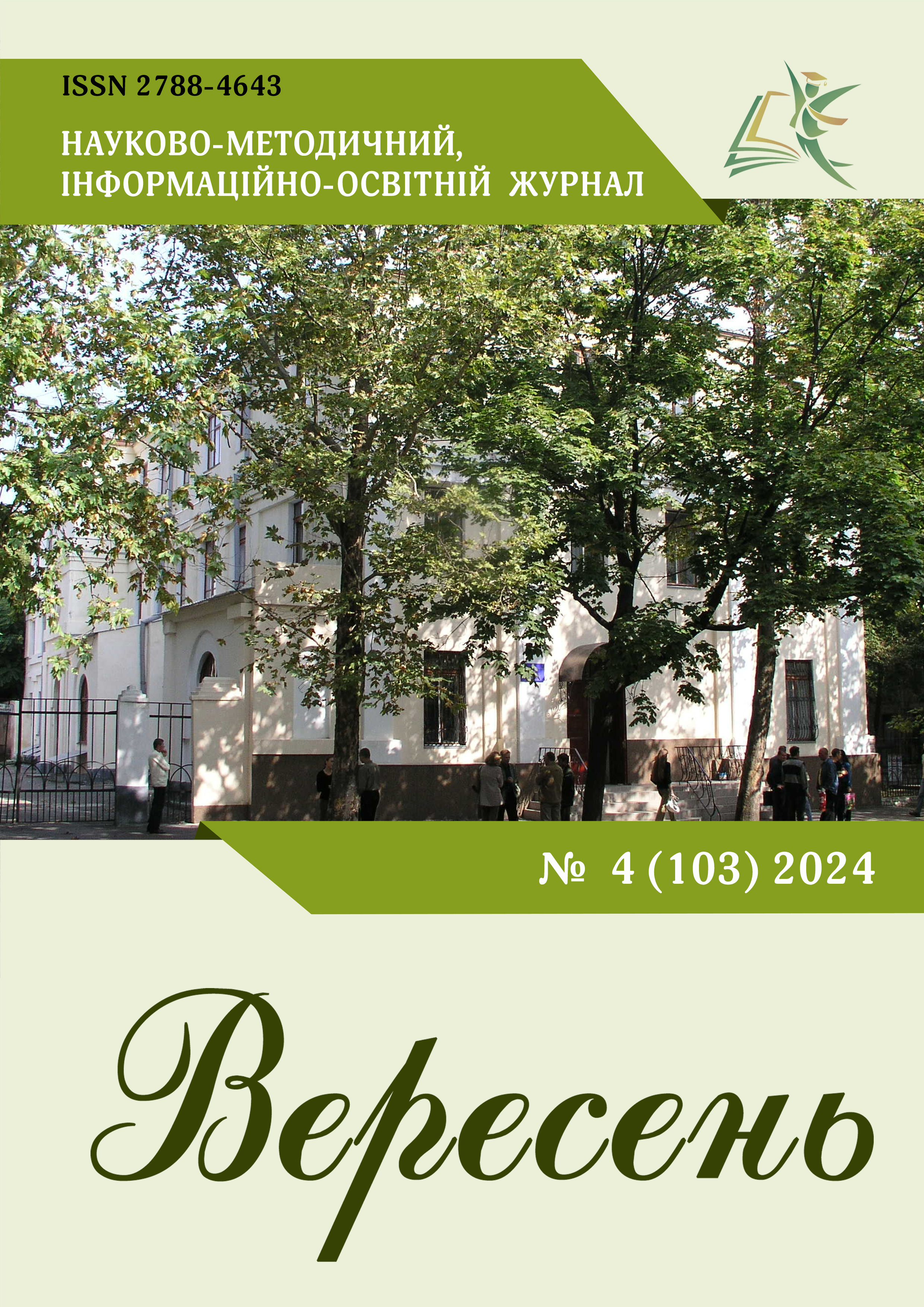DEVELOPING LEADERSHIP QUALITIES IN PRIMARY EDUCATION LEARNERS
DOI:
https://doi.org/10.54662/veresen.4.2024.04Keywords:
education seekers, elementary school, leadership qualities, typical educational programs, receptionsAbstract
The scientific and methodical article updates the problem of the need to form leadership qualities in primary school. The conditions, approaches, methods, and forms of working with 4th- grade students in the lessons of the integrated course “I Explore the World” and in extracurricular activities are substantiated. The resources are offered that will contribute to the identification and development of leadership in the educational process. The methodical approaches to the process of formation of organizational abilities of younger schoolchildren have been determined. It has been established that the expected learning outcomes of education seekers and cross-cutting skills are key to the formation of leadership qualities. The tips for teachers, a selection of techniques for the formation of leadership qualities in primary school, have been prepared. Sean Covey’s ideas became widespread. Recommendations have been developed on how to organize the educational process using the «7 Habits of Happy Children» practices. The indicators of the questionnaire are presented, and the results of the level of formation of leadership qualities of the fourth-graders are analyzed, which indicate that students have sufficient skills of cooperation with others, confidence in decision-making, agreement to achieve results, the ability to think critically, self-care, and effective use of knowledge in life situations. The standard educational programs for grades 1–4 under the leadership of R. B. Shyian and O. Ya. Savchenko were analyzed. It has been established that the formation and development of leadership qualities goes through the content of the integrated course «I Explore the World» and the proposed subject of classes, to reveal the potential of the individual, it is necessary to implement 7 habits of happy children, to form the skills of the 21st century. The meaningful content of the research lies in the possibility of practical use of the obtained results both in the methodical work of pedagogical workers of educational institutions and in the system of postgraduate pedagogical education.
References
Alfimov, D. V. (2013). Spetsyfika vykhovannia liderskykh yakostei shkoliariv u suchasnii zahalnoosvitnii shkoli [The specifics of education of leadership qualities of schoolchildren in a modern comprehensive school]. Pedahohika formuvannia tvorchoi osobystosti u vyshchii i zahalnoosvitnii shkolakh. Vyp. 31, 426–432. Retrieved from: http://surl.li/oexbjz (ukr).
Derzhavnyi standart pochatkovoi osvity (2019). [State standard of primary education]. Retrieved from: http://surl.li/tctb (ukr).
Desiatnyk, K. & Tymoshchuk, O. (2022). Metodyka formuvannia liderskykh yakostei molodshykh shkoliariv u pozaurochnii roboti [Methodology of formation of leadership qualities of junior high school students in extracurricular work]. Acta Paedagogisa Volynienses, 4, 68–74. DOI: https://doi.org/10.32782/apv/2022.4.11 (ukr).
Hladun, V. V. (2021). Kooperatyvne navchannia yak zasib demokratyzatsii osvitnoho protsesu [Cooperative learning as a means of democratization of the educational process]. Veresen, 3 (90), 80–89. DOI: https://doi.org/10.54662/veresen.3.2021.07 (ukr).
Kontseptsiia Novoi ukrainskoi shkoly (2016). [Concept of the New Ukrainian School]. Retrieved from: http://surl.li/hoha (ukr).
Kovi Shon. (2022). 7 zvychok shchaslyvykh ditei [7 Habits of Happy Children]. Lviv: Vydavnytstvo Staroho Leva (ukr).
Kovi Stiven. (2023). 7 zvychok nadzvychaino efektyvnykh liudei [7 Habits of Highly Effective People]. (ukr).
Lider u meni (2024). [Leader in me]. Franklin Covey Education Ukraine. Retrieved from: http://surl.li/stysxk (ukr).
Nestulia, O. O., Nestulia, S. I. & Kononets, N. V. (2021). Dydaktyka liderstva. Suchasni pohliady na formuvannia liderskoi kompetentnosti zdobuvachiv vyshchoi osvity [Didactics of leadership. Modern views on the formation of leadership competence of students of higher education]. Poltava: PUET (ukr).
Tannenbaum, R., Shmidt, V. (2017). Yak obraty styl liderstva [How to choose a leadership style]. K.: Knyholav, 72 (ukr).
Typovi osvitni prohramy dlia 1–4 klasiv. (2022). [Typical educational programs for grades 1–4]. Retrieved from: http://surl.li/uiogai (ukr).
Vitkovska, O. D. (2021). Vykorystannia pedahohiky partnerstva v osvitnomu protsesi [Using partnership pedagogy in the educational process]. Veresen, 4 (91), 25–32. DOI: https://doi.org/10.54662/veresen.4.2021.03 DOI: https://doi.org/10.54662/veresen.4.2021.03 (ukr).




